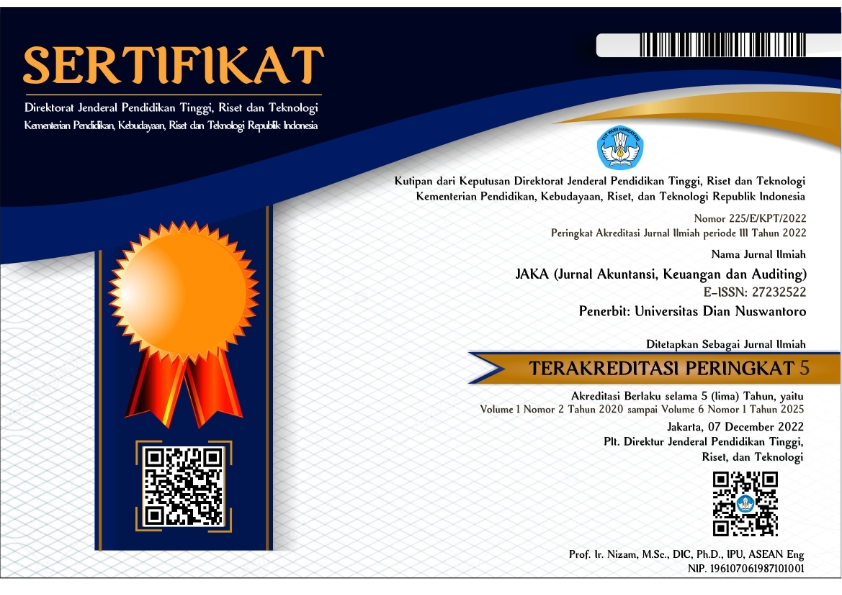Pengaruh Keuangan Islam Kesultanan Utsmaniyah Terhadap Pertumbuhan Ekonomi
DOI:
https://doi.org/10.56696/jaka.v3i2.8852Abstract
The Ottoman Empire was the center of the Islamic caliphate because it was the strongest Islamic government of its time. The peak of the progress of the Ottoman Turks during the reign of Sultan Mahmud II. In this study, there was a government policy system during the Ottoman dynasty, namely by implementing a policy system in the form of waqf and accounting systems in government institutions, so looking at the policy system that had been made by the dynasty government, did it have an influence on economic growth during the Ottoman dynasty.The aim of the research is to explain the concept of how the Islamic finance of the Ottoman Empire influences economic growth. In the context of Islamic finance during the Ottoman Empire there was an increase in economic growth, this increase had an effect on economic growth but if it had no effect then economic growth during the Ottoman Empire would decreaseThe method used in this research is qualitative research, which seeks to explore, understand, and seek social phenomena. The research used in this research is qualitative research. Data collection techniques used in this study are through observation (observation), interviews (interviews), and documentation. According to Miles & Huberman, the data analysis technique used consists of three streams of activities that occur simultaneously, namely data reduction, data presentation, drawing conclusions or verification.Pay waqf policies and manage finances with an accounting financial reporting system. Where by establishing this policy, from the discussion that has been described above, we can conclude that economic growth during the Ottoman Empire experienced an increase, where in the waqf section it could be used to build mosques, build schools, support orphans and needs for people in need. Then with the implementation of the accounting system, the financial reports during the kingdom could be seen in detail and clearly about the income, expenses received by the kingdom so that there was no element of fraud or corruption at that time.References
Achdar, M. Nur Ilham dan Askar Nur. (2020). Pemikiran dan Praktek Akuntansi Di Masa Dinasti Turki Usmani.
Anggito, Albi dan Johan Setiawan. (2018). Metodologi Penelitian Kualitatif. CV Jejak.
Ash Shalbi, Ali Muhammad. (2017). Sejarah Daulah Utsmaniyah terj. Imam Fauzi. Ummul QURA.
Ats Tsunayyan, Khulaif. (2021). Sejarah Turki Usmani dari Kabilah Ke Imperium. Pustaka Al- Kautsar.
Bakri, Syamsul. (2011). Peta Sejarah Peradaban Islam. Fajar Media Press.
Bosworth, C.E.. (1980). Dinasti-Dinasti Islam. Mizan.
Hery. (2015). Analisis Laporan Keuangan. CAPS.
Imber, Colin. (2012). Kerajaan Ottoman: Struktur Kekuasaan Sebuah Kerajaan Islam Terkuat Dalam Sejarah. Elex Media Komputindo.
Iskandar. (2020). Implementasi Wakaf Uang Pada Masa Kesultanan Utsmaniyah. Jurnal Ekonomi Syariah, Vol. 1(1).
Ratnasari, Dwi. (2013). Sulaiman Al-Qanuni: Sultan Terbesar Kerajaan Turki Utsmani Jurnal Thaqafiyyat Vol. 14.
Saharuddin, Desmi dan Meirison. (2021). Aplikasi Keuangan Islam dan Sistem Perekonomian Turki Utsmani. Skripsi UIN Syarif Hidayatulloh Jakarta.
Mami, Nofrianti, dan Kori Lilie Muslim. (2019). Kemajuan Islam pada Masa Kekaisaran Turki Utsmani. Jurnal Fuaduna: Jurnal Kajian Keagamaan Dan Kemasyarakatan, Vol. 3(1).
Miles dan Huberman. (1992). Analisis Data Kualitatif. Universitas Indonesia Press.
Nadinta, Maya Astria. (2020). Ikrar Cinta. CV Jejak.
Ni’ matuzahroh dan Susanti Prasetyaningrum. (2018). Observasi: Teori dan Aplikasi Psikologi. UMM Press.
Pulungan, Suyuthi. (2019). Sejarah Pendidikan Islam. Prenadamedia Group.
Rahmawati dan Rizka Kusuma. (2017). Studi Historis Kebijakan Luar Negeri Sultan Abdul Hamid II di Daulah ‘Utsmaniyah (1876-1909 M). JUSPI (Jurnal Sejarah Peradaban Islam), Vol. 1(1).
Sugiono. (2014). Memahami Penelitian Kualitatif,. Alfabeta.
_______. (2017). Metode Penelitian Bisnis. Alfabeta.
Utari, Dewi dkk. (2014). Dewi Utari, dkk., ”Manajemen Keuangan”. Mitra Wacana Media.
Yatim, B.. (2014). Sejarah Peradaban Islam: Dirasah Islamiyah II. Raja Grafindo Persada.
Downloads
Published
How to Cite
Issue
Section
License
Copyright (c) 2023 JAKA (Jurnal Akuntansi, Keuangan, dan Auditing)

This work is licensed under a Creative Commons Attribution-ShareAlike 4.0 International License.












